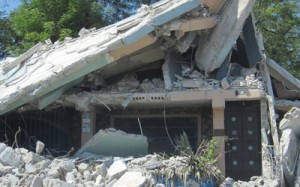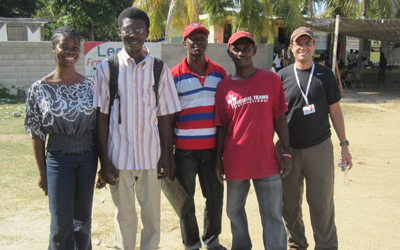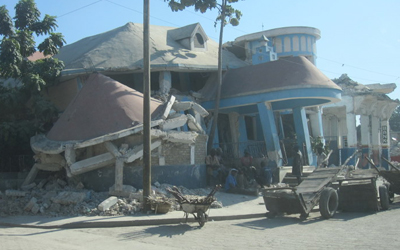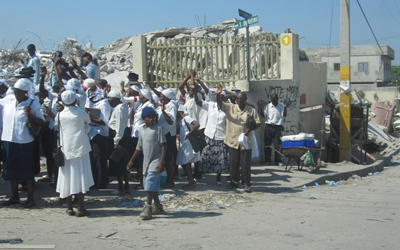Dr. Steve Sethi, HFH board member, reports on his recent trip to Haiti:
 The situation all around Haiti is so incredible that it’s hard to express in words. The sheer enormity of the destruction can hardly be conveyed adequately by words or pictures, and the emotional trauma is even more hidden. There are fallen buildings for miles, thousands of people living in the open, and many Haitians just struggling to keep their families alive. I was privileged to contribute a tiny fraction to the work many are doing to help relieve and reconstruct.
The situation all around Haiti is so incredible that it’s hard to express in words. The sheer enormity of the destruction can hardly be conveyed adequately by words or pictures, and the emotional trauma is even more hidden. There are fallen buildings for miles, thousands of people living in the open, and many Haitians just struggling to keep their families alive. I was privileged to contribute a tiny fraction to the work many are doing to help relieve and reconstruct.
For a week, I worked with a public health specialist with our partner organization MTI, interviewing people in earthquake affected villages around Leogane to find out their longer term needs. We did hear that health care is very hard to find, but most people are just struggling to get enough water or find a usable latrine. The early recovery needs will certainly include the basic necessities of water and sanitation.
Beyond the physical needs, the emotional catastrophe is widespread. Nearly every person I saw, either in the villages or in clinics, talked about how fearful they were. They talked about being easily startled, quickly forgetful, preoccupied by a feeling of shaking, and a sense that they just weren’t the same person anymore. They are worried about their families and how to take care of them. They are going to need the support of churches, counselors, and our prayers.
The second week was spent with our partners in Terre Blanche. While the physical destruction can’t be seen after 20 miles out of the capital, the impact of the earthquake is unmistakable. I spent a day interviewing patients at our clinic and visiting homes in the village, and found that earthquake survivors are in every community, usually doubling the household sizes. Just as in Port-au-Prince, people everywhere are traumatized.
A Haitian friend at the clinic told me that 99 percent of the country has been affected — either a family member or a friend or a distant relative was killed. Even more than 100 miles away from the earthquake, he carries the burden of thinking his family might die at any moment. But he also sees this as a wake up call from God — an indication of his power and a call to turn to him. It is true that things have changed — Carnival (with the loud ra-ra bands and dangerous alcoholic crowds) was cancelled and instead there was a three-day period of prayer. Along the roads in every town, whole churches went out marching, singing hymns and praying.
It was this commitment to prayer that gave me hope. In the midst of tragedy, people are praising God! Could I have that kind of faith? Our friends in Terre Blanche, the volunteers we’ve trained in health promotion, are still eager and active, visiting homes to teach families how to prevent diarrhea and referring sick children to the clinic. These brothers and sisters are a testament to enduring faith and, as Pastor Delamy says, a personification of grace. And people here at home are giving hope as well, by praying and caring about Haiti. Thank you.

Steve and other workers in Haiti.

Collapsed house in Leogane.

Church members singing on a street corner.












 Instagram Feed
Instagram Feed

